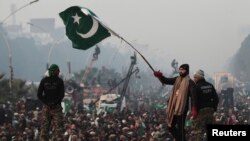ISLAMABAD —
Firebrand Muslim cleric Tahir-ul Qadri said Wednesday his supporters would not abandon their sit-in on the streets of Pakistan's capital until the country implements his demands for clean and transparent national elections.
In a three-hour speech to thousands of supporters camped out in front of the nation's parliament, Tahir-ul Qadri on Wednesday accused the government of deep-seated corruption and demanded that all the nation's political assemblies be dissolved.
"The corrupt status quo must go. Not allowed," said Qadri. "The status quo must go, the status quo must go. Go."
The cleric, a Canadian-Pakistani who burst onto Pakistan's political scene last month, is also demanding the installation of a caretaker government that would introduce electoral reforms in order to bar what he calls the "corrupt" existing political elite from returning to power.
Information Minister Qamar Zaman Kaira on Wednesday mocked Qadri's finger-wagging rhetoric and questioned the legality of Qadri's demands. Kaira said national elections would go ahead under the rules of the country's constitution.
It is unclear what will happen if Qadri's demands are not met. Lawmaker Ayaz Amir says the government is in a difficult position.
"Either we have a mini-Tiananmen Square, which means the government resorts to violence to disperse the protestors, but (the) government I don’t see doing that -- it is too weak, too confused," said Amir. "It can't, I don’t think, afford the risk."
Supporter Abdul Rehman, one of some 50,000 staging the occupation of Islamabad's main avenue, which began on Monday, instead called on the anti-government party of Imran Khan to join the protest.
"I think Imran Khan (should) join this session, join the crowd, and come and hand shake with Qadri-saab and continue this session," said Rehman.
But Shafqat Mehmood, a spokesman for Khan's opposition PTI party, said it was unlikely that Qadri's street tactics would attract opposition political parties, even if they agreed with his message.
"What we believe is that real change can only come through elections, and that is our difference with Mr. Qadri -- that we don’t believe that street pressure should be used to create change. But change should come through the electoral process," said Mehmood.
Pakistan's parliament is due to complete its five-year constitutional term in mid-March, and new national polls are expected to be held in May. If there is no disruption, it would be the first time a democratically elected government completed its term and transferred power to another democratically elected government.
Some suspect that Pakistan's powerful military may be behind Qadri. The religious leader represents the Barelvi sect of Islam, which emphasizes moderation and tolerance, and he heads a Muslim charity that has branches both inside and outside Pakistan.
In a three-hour speech to thousands of supporters camped out in front of the nation's parliament, Tahir-ul Qadri on Wednesday accused the government of deep-seated corruption and demanded that all the nation's political assemblies be dissolved.
"The corrupt status quo must go. Not allowed," said Qadri. "The status quo must go, the status quo must go. Go."
The cleric, a Canadian-Pakistani who burst onto Pakistan's political scene last month, is also demanding the installation of a caretaker government that would introduce electoral reforms in order to bar what he calls the "corrupt" existing political elite from returning to power.
Information Minister Qamar Zaman Kaira on Wednesday mocked Qadri's finger-wagging rhetoric and questioned the legality of Qadri's demands. Kaira said national elections would go ahead under the rules of the country's constitution.
It is unclear what will happen if Qadri's demands are not met. Lawmaker Ayaz Amir says the government is in a difficult position.
"Either we have a mini-Tiananmen Square, which means the government resorts to violence to disperse the protestors, but (the) government I don’t see doing that -- it is too weak, too confused," said Amir. "It can't, I don’t think, afford the risk."
Supporter Abdul Rehman, one of some 50,000 staging the occupation of Islamabad's main avenue, which began on Monday, instead called on the anti-government party of Imran Khan to join the protest.
"I think Imran Khan (should) join this session, join the crowd, and come and hand shake with Qadri-saab and continue this session," said Rehman.
But Shafqat Mehmood, a spokesman for Khan's opposition PTI party, said it was unlikely that Qadri's street tactics would attract opposition political parties, even if they agreed with his message.
"What we believe is that real change can only come through elections, and that is our difference with Mr. Qadri -- that we don’t believe that street pressure should be used to create change. But change should come through the electoral process," said Mehmood.
Pakistan's parliament is due to complete its five-year constitutional term in mid-March, and new national polls are expected to be held in May. If there is no disruption, it would be the first time a democratically elected government completed its term and transferred power to another democratically elected government.
Some suspect that Pakistan's powerful military may be behind Qadri. The religious leader represents the Barelvi sect of Islam, which emphasizes moderation and tolerance, and he heads a Muslim charity that has branches both inside and outside Pakistan.






